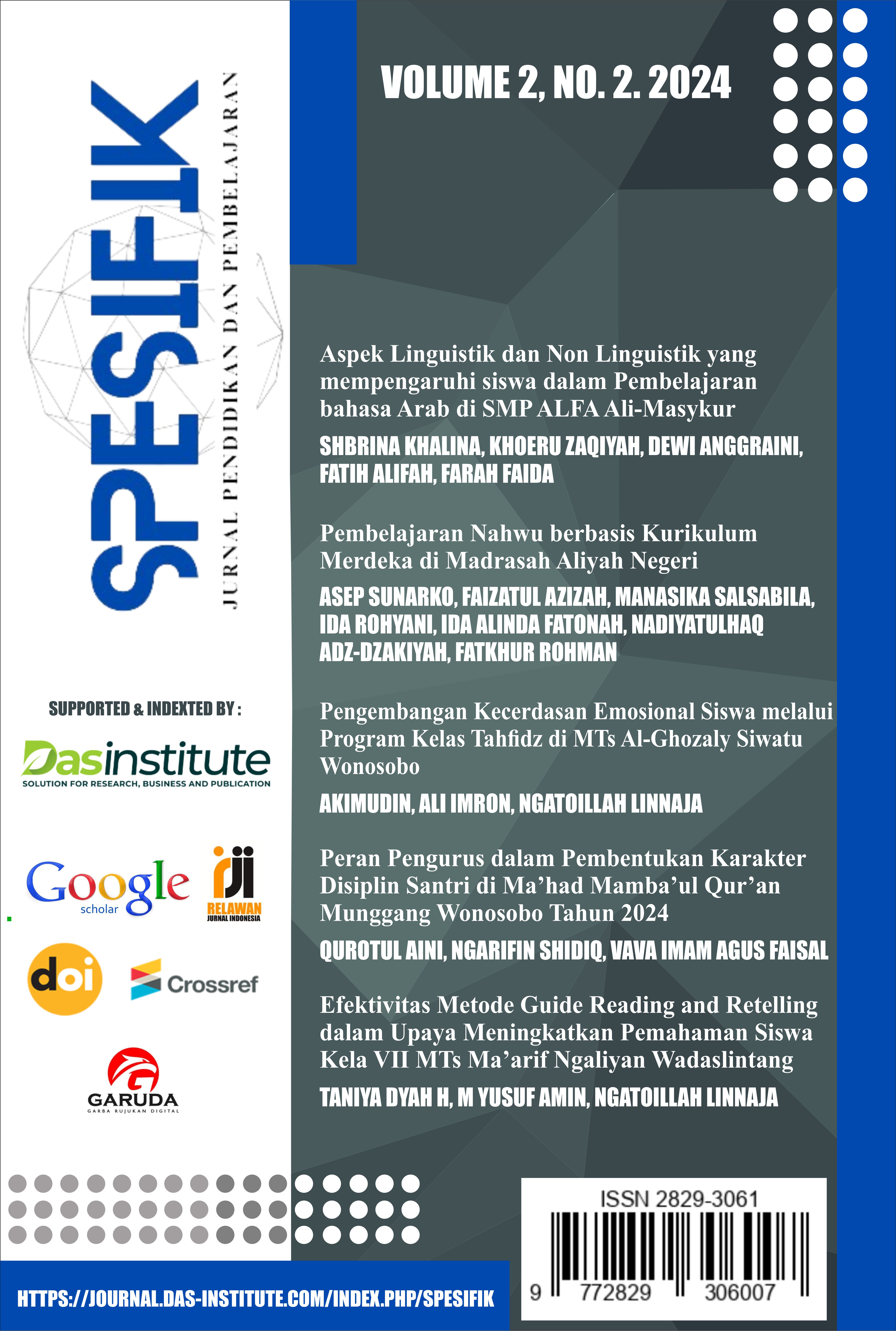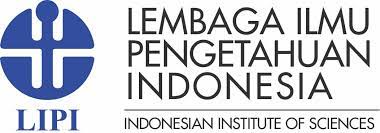Aspek Linguistik Dan Non Linguistik Yang Mempengaruhi Siswa Dalam Pembelajaran Bahasa Arab Di SMP Alfa Ali Masykur
DOI:
https://doi.org/10.53866/spesifik.v2i2.514Keywords:
Linguistic aspects, non-linguistic aspects, influenceAbstract
Learning Arabic cannot be separated from linguistic and non-linguistic aspects. Linguistic aspects, for example related to vocabulary, Arabic grammar (nahwu and sharaf), language skills (speaking skills, listening skills, reading skills and writing skills) and non-linguistic aspects include teachers, student motivation, learning process and learning environment. This research aims to explore the influence of these two aspects in learning Arabic at Alfa Ali Maskur Middle School, Mojotengah, Wonosobo.
This research is qualitative descriptive research in the form of field research with data collection methods in the form of observations which function to determine all Arabic language learning activities and interviews as reinforcement for obtaining data related to the influence of linguistic and non-linguistic aspects that influence it. The data analyst uses data triangulation and inductive thinking.
The results of this research illustrate that in learning Arabic at Alfa Ali Maskur Middle School, non-linguistic aspects really help improve the linguistic aspects of students whose backgrounds have never studied Arabic at a previous level of education, especially in the aspect of increasing motivation for learning Arabic. This indicates that students' lack of proficiency regarding Arabic language skills and its elements can be improved properly when the learning system is created and prepared well and implemented appropriately while always paying attention to linguistic and non-linguistic aspects.
References
Arifin, A. (2017). Peranan Permainan Bahasa Dalam Proses Kegiatan Belajar Mengajar Mata Pelajaran Bahasa Arab. An Nabighoh Jurnal Pendidikan Dan Pembelajaran Bahasa Arab, 19(2), 302. Https://Doi.Org/10.32332/An-Nabighoh.V19i2.1005
Arikunto, S. (1999). Dasar-Dasar Evaluasi Pendidikan. Bumi Aksara.
Asep Sunarko, Abdulbasit, Faozi Latif. (2020). The Development Of A Textbook Using Dick And Carey Instructional Model And Carey Model To Improve Fluently Speaking Skill (Development And Experimental Study On The Students Of Sains Al-Quran University (Unsiq) In Central Java Indonesia): تطوير كتاب تعليمي للغة العربية بنمط ديك وكاري ونمط كاري لتنمية طلاقة الكلام (دراسة تطويرية وتجريبية على الطلاب في جامعة علوم القرآن - جاوى الوسطى إندونيسيا). مجلة العلوم التربوية و النفسية, 4(19), 5. Https://Doi.Org/10.26389/Ajsrp.A080120
Cahyani, M., Sunarko, A., Mulyani, P. S., & Fatkhurrohman, F. (2023). Telaah Komprehensif Penyajian Materi Dan Teknik Evaluasi Buku Teks Bahasa Arab Kelas Viii Madrasah Tsanawiyah Kma Nomor 183 Terbitan Kemenag Tahun 2020. Lisanan Arabiya: Jurnal Pendidikan Bahasa Arab, 7(1), 1–17. Https://Doi.Org/10.32699/Liar.V7i1.4624
Farida, U., Sunarko, A., Faida, F., Assegaf, U. S., & Zulfi, I. (2023). Istihdamu Toriqotil ‘Asho An Natiq Litarqiyatil Mahaarotil Kalam Litalamidi Al Shof Al ‘Asir Bil Madrasah Atsanawiyah An Nida Selomerto Wonosobo. The Asian Journal Of Innovative Research In Social Science, 02(01).
Hadi, S. (1986). Metodologi Research (Jilid 2,). Andi Offset.
Hidayat, N. S. (2012). Problematika Pembelajaran Bahasa Arab. 37(1).
Mardalis. (1995). Metode Penelitian: Suatu Pendekatan Proposal. Bumi Aksara.
Masri, S., & Sofran, E. (1995). Metode Penelitian Survey. Lp3es.
Meutia, C. I., Wiandari, F., & Husaini, A. H. (2020). Problematika Non-Linguistik Siswa Dalam Berbicara Bahasa Inggris. 7(2).
Mustafa, P. S., Gusdiyanto, H., Victoria, A., Masgumelar, N., Lestariningsih, N., Maslacha, H., Ardiyanto, D., Hutama, H., Boru, M., Fachrozi, I., Rodriquez, E., Prasetyo, T., & Romadhana, S. (2020). Metodologi Penelitian Kuantitatif, Kualitatif, Dan Penelitian Tindakan Kelas Dalam Pendidikan Olahraga.
Rahmiati, R., Sunarko, A., & Rois, A. (2022). Efektifitas Model Pembelajaran Jigsaw Berbasis Permainan Puzzle Untuk Meningkatkan Kemampuan Qira’ah Di Smp Takhasus Al Qur’an Wonosobo. Lisanan Arabiya: Jurnal Pendidikan Bahasa Arab, 6(1), 103–118. Https://Doi.Org/10.32699/Liar.V6i1.2760
Ramli, M. (2015). Hakikat Pendidik Dan Peserta Didik. 5(1).
Siyoto, S., & Sodik, M. A. (2015). Dasar Metodologi Penelitian. Literasi Media Publishing.
Sugiyono. (2008). Metode Penelitian Pendidikan: (Pendekatan Kuantitatif, Kualitatif Dan R & D). Alfabeta.
Tanzeh, A. (2011). Metodologi Penelitian Praktis,. Teras.
















